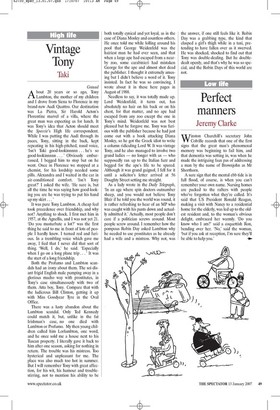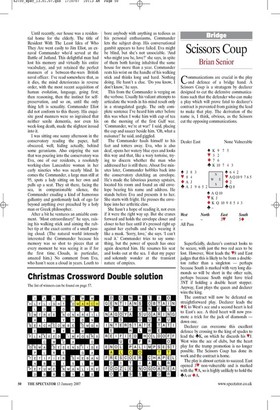Perfect manners
Jeremy Clarke Winston Churchill's secretary John Colville records that one of the first signs that the great man's phenomenal memory was beginning to fail him, and that dementia was setting in, was when he made the intriguing faux pas of addressing a man by the name of Brownjohn as Mr Shorthorn.
A sure sign that the mental ebb tide is in full flood, of course, is when you can't remember your own name. Nursing homes are packed to the rafters with people who've forgotten what they're called. It's said that US President Ronald Reagan, making a visit with Nancy to a residential home for the elderly, was led up to the oldest resident and, to the woman's obvious delight, embraced her warmly. 'Do you know who I am?' said a coquettish Ron, bending over her. 'No,' said the woman, 'but if you ask at reception, I'm sure they'll be able to help you.'
Until recently, our house was a residential home for the elderly. The title of Resident With The Least Idea of Who They Are went easily to Jim Eliot, an exnaval Commander who'd served at the Battle of Jutland. This delightful man had lost his memory and virtually his entire vocabulary, and yet retained the perfect manners of a between-the-wars British naval officer. I've read somewhere that, as it dies, the mind deteriorates in reverse order, with the most recent acquisition of human evolution, language, going first; then reasoning, then the instinct for selfpreservation, and so on, until the only thing left is sexuality. Commander Eliot did not conform to this theory. His exquisite good manners were so ingrained that neither senile dementia, nor even his week-long death, made the slightest inroad into it.
I was sitting one sunny afternoon in the conservatory reading the paper, half obscured, well, hiding actually, behind some geraniums. Also enjoying the sun that was pouring into the conservatory was Eva, one of our residents, a resolutely working-class Lancashire woman in her early nineties who was nearly blind. In comes the Commander, a large man still at 95, spots a lady sitting on her own and pulls up a seat. They sit there, facing the sea, in companionable silence, the Commander exuding a kind of humorous gallantry and gentlemanly lack of ego far beyond anything ever preached by a holy man or Greek philosopher.
After a bit he ventures an amiable comment. 'Most extraordinary!' he says, raising his walking stick and aiming the rubber tip at the exact centre of a small passing cloud. (The natural world intensely interested the Commander because his memory was so shot to pieces that at every moment he was seeing it as if for the first time. Clouds, in particular, amazed him ) No comment from Eva, who hasn't seen a cloud in years. Loath to bore anybody with anything as tedious as his personal enthusiasms, Commander lets the subject drop. His conversational gambit appears to have failed. Eva might be blind, but she's not unsociable. 'And who might you be, love?' she says, in spite of them both having inhabited the same house for more than a year. Commander rests his wrist on the handle of his walking stick and thinks long and hard. Nothing doing. He hasn't a clue. `Do you know, I don't know,' he says.
This from the Commander is verging on the verbose. Usually his valiant attempts to articulate the words in his mind result only in a strangulated gurgle. The only complete sentence I've heard him utter before this was when I woke him with cup of tea on the morning of the first Gulf war. 'Commander, we're at war!' I said, placing the cup and saucer beside him 'Oh, what a nuisance!' he said, and giggled.
The Commander hauls himself to his feet and totters away. Eva, who is also deaf, opens her watery blue eyes and looks this way and that, like a wary tortoise, trying to discern whether the man who addressed her is still there. About five minutes later, Commander hobbles back into the conservatory clutching an envelope. He's made the laborious journey upstairs, located his room and found an old envelope bearing his name and address. He stands before Eva and presents it to her. She starts with fright. He presses the envelope into her arthritic claw.
She hasn't a hope of reading it, not even if it were the right way up. But she cranes forward and holds the envelope closer and closer to her face until it's pressed right up against her eyeballs and she's wearing it like a mask. 'Sorry, love,' she says. 'I can't read it.' Commander tries to say something, but the power of speech has once again deserted him He resumes his seat and looks out at the sea. I shut my paper and solemnly wonder at the transient nature of empires.























































 Previous page
Previous page